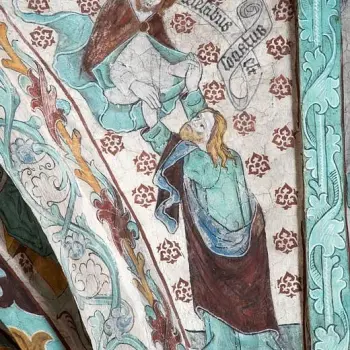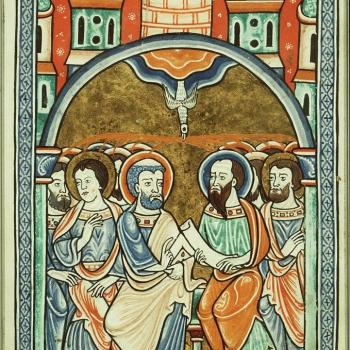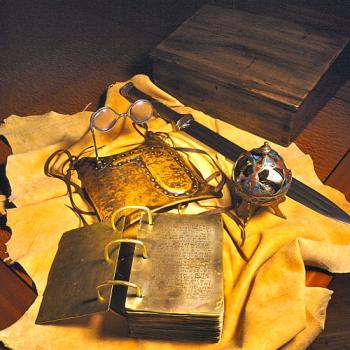Repeatedly reminded by prophetic voices over the past year that the Book of Mormon, written for our day, is a witness and warning, I decided to track the reign of chief judges to watch for governmental strength and weakness. I learned that freedom was constantly under fire by power-hungry opponents. The insatiable quest for power and authority caused the ultimate devolution of the Nephite government and complete destruction of its civilization.
The Reign of Chief Judges
Mosiah changed the system of government by creating tiers of judges chosen by the people and reset the calendar to year 1, according to the reign of the judges.
Now it is not common that the voice of the people desireth anything contrary to that which is right; but it is common for the lesser part of the people to desire that which is not right; therefore this shall ye observe and make it your law—to do your business by the voice of the people.
And if the time comes that the voice of the people doth choose iniquity, then is the time that the judgments of God will come upon you; yea, then is the time he will visit you with great destruction even as he has hitherto visited this land. (Mosiah 29:26-27)
Alma became the first chief judge.
In the fifth year of the reign of the judges, Amlici aspired to be king. Amlici, a Nehor, was cunning and wise to the ways of the world. He gathered a large following and his kingship went to a vote.
Therefore, if it were possible that Amlici should gain the voice of the people, he, being a wicked man, would deprive them of their rights and privileges of the church; for it was his intent to destroy the church of God. (Alma 2:4)
The majority voted against Amlici. Amlici’s followers decided to consecrate Amlici to be their king anyway, called themselves Amlicites, and marked their foreheads with red. They immediately planned a military coup to overthrow the government. 12,500 Amlicites died. 6,562 Nephites died. The Amlicites then joined the Lamanite’s army who were en route to fight the Nephites. Alma, the chief judge, slew Amlici in battle. The Nephites overcame the Lamanite army though countless numbers of men, women, and children perished. (Alma 2-3)
In the ninth year of the reign of the judges, Alma stepped down as chief judge to focus on his role as the church’s high priest. The people confirmed Alma’s chief judge appointment of Nephihah, a wise man who was an elder in the church. (Alma 4)
In the seventeenth year of the reign of the judges, after Alma and Amulek preached the gospel to the Zoramites, the Zoramites realized it destroyed their craft. The Zoramites called a referendum to secretly discover who subscribed to the gospel. Those people were thrust out of the land and were welcomed by the people of Ammon as refugees. Angry that the Ammonites welcomed their outcasts, the Zoramites decided to enlist the help of the Lamanites to destroy their outcasts and the people of Ammon. (Alma 35)
In the eighteenth year of the reign of the judges, the Zoramites broke off from the Nephites, becoming Lamanites. Their combined forces declared war against Moroni and his Nephite army. (Alma 43)
In the nineteenth year of the reign of the judges, dissensions escalated among the church teachers, leaders, and lower judges, accelerated by their pride grown by riches and a quest for power. Amalickiah gained popularity, sought to rule, and dissented from the church.
Yea, and we also see the great wickedness one very wicked man can cause to take place among the children of men.
Yea, we see that Amalickiah, because he was a man of cunning device and a man of many flattering words, that he led away the hearts of many people to do wickedly; yea, and to seek to destroy the church of God, and to destroy the foundation of liberty which God had granted unto them, or which blessing God had sent upon the face of the land for the righteous’ sake. (Alma 46:9-10)
Moroni rallied the people committed to liberty.
Now Moroni being a man who was appointed by the chief judges and the voice of the people, therefore he had power according to his will with the armies of the Nephites, to establish and to exercise authority over them. (Alma 46:34)
When Amalekiah saw the opposition exceeded his number (and knew that some of his dissenters doubted in his cause,) he decided they should join the Lamanites. Moroni stopped their exodus and compelled the dissenters to support liberty or perish. Amalekiah and a small group evaded capture and joined the Lamanites. Through cunning and murder, Amalekiah eventually became the king of the Lamanites and waged war against the Nephites in his persistent efforts to rule over the Nephites.
In the twenty-fourth year of the reign of the judges, Nephihah, the second chief judge, died. His son Pahoran became chief judge
with an oath and sacred ordinance to judge righteously, and to keep the peace and the freedom of the people, and to grant unto them their sacred privileges to worship the Lord their God, yea, to support and maintain the cause of God all his days, and to bring the wicked to justice according to their crime. (Alma 50:39)
In the twenty-fifth year of the reign of the judges, king-men asked Pahoran to alter the law to remove the chief judge position. Pahoran did not. The platform of king (king-men) vs chief judge (freemen) went to a vote. The voice of the people voted for freemen. (Alma 51)
Now those who were in favor of kings were those of high birth, and they sought to be kings; and they were supported by those who sought power and authority over the people (Alma 51:8)
Amalickiah and his Lamanite army appeared on the scene at the same time and the king-men refused to fight with the Nephite army. Moroni
sent a petition, with the voice of the people, unto the governor of the land, desiring that he should read it, and give him (Moroni) power to compel those dissenters to defend their country or to put them to death. For it was his first care to put an end to such contentions and dissensions among the people; for behold, this had been hiterto a cause of all their destruction. And it came to pass that it was granted according to the voice of the people (Alma 51:15-16)
Four thousand king-men perished. The rest yielded. The Nephites scrambled to defend themselves against the Lamanites.
In the thirtieth year of the reign of the judges, and five years into the war (against men who sought to be Nephite kings as Nephites,) king-men gained power and forced Pahoran to flee. They conquered Zarahemla, appointed a king, and joined the Lamanites. Pahoran and Moroni called on freemen to gather and fought to reclaim Zarahemla. Again the freemen were victorious. (Alma 62)
In the fortieth year of the reign of the judges, Pahoran, the third chief judge died. His three sons campaigned for the judgment seat. The voice of the people appointed Pahoran II. Pacumeni conceded. Paanchi, however, rebelled.
And it came to pass as he was about to do this, behold, he was taken, and was tried according to the voice of the people, and condemned unto death; for he had raised up in rebellion and sought to destroy the liberty of the people. (Helaman 1:8)
Paanchi’s followers, angry at his verdict, sent Kishkumen to assassinate Pahoran, the fourth chief judge. Kishkumen and his band camouflaged themselves throughout their community and remained unidentified.
And now behold, Pacumeni was appointed, according to the voice of the people, to be a chief judge and a governor over the people, to reign in the stead of his brother Pahoran. (Helaman 1:13)
In the forty-first year of the reign of the judges, the Lamanites came to war again—with the next-generation dissenter still trying to wrench the Nephite government away from the voice of the people. The Lamanite general slew Pacumeni, the fifth chief judge.
In the forty-second year of the reign of the judges, after the Nephites claimed another victory against the Lamanites, people campaigned for the chief judge’s seat. The voice of the people appointed Helaman. Kishkumen attempted to assassinate Helaman but was killed by Helaman’s loyal servant. The band fled the land. (Helaman 2)
In the fifty-third year of the reign of the judges, Helaman, the sixth chief judge, died. His son Nephi was appointed. (Helaman 3)
In the fifty-fourth year of the reign of the judges, dissenters again sought power and were stymied, so tried to elicit the Lamanites’ help. The Lamanites refused. (Helaman 3)
In the fifty-sixth year of the reign of the judges, dissenters again sought power and were stymied, so tried to elicit the Lamanites’ help. This time they succeeded. The Lamanites came to war and prevailed. The Nephites fought to regain their lands but eventually gave up and left some in the Lamanites’ possession. (Helaman 4)
They began to remember the prophecies of Alma, and also the words of Mosiah; and they saw that they had been a stiffnecked people, and that they had set at naught the commandments of God;
And that they had altered and trampled under their feet the laws of Mosiah, or that which the Lord commanded him to give unto the people; and they saw that their laws had become corrupted, and that they had become a wicked people, insomuch that they were wicked even like unto the Lamanites.
And because of their iniquity the church had begun to dwindle; and they began to disbelieve in the spirit of prophecy and in the spirit of revelation; and the judgments of God did stare them in the face.
And they saw that they had become weak, like unto their brethren, the Lamanites, and that the Spirit of the Lord did no more preserve them; yea, it had withdrawn from them becasue the Spirit of the Lord doth not dwell in unholy temples—
Therefore the Lord did cease to preserve them by his miraculous and matchless power, for they had fallen into a state of unbelief and awful wickedness…. (Helaman 4:21-25)
In the sixty-first year of the reign of the judges, Nephi, the seventh chief judge, yielded up the judgment seat to Cezoram and began to preach repentance. The Book of Mormon doesn’t say if the voice of the people chose Cezoram. It does say that
For as their laws and their governments were established by the voice of the people, and they who chose evil were more numerous than they who chose good, therefore they were ripening for destruction, for the laws had become corrupted.
Yea, and this was not all; they were a stiffnecked people, insomuch that they could not be governed by the law nor justice, save it were to their destruction.
And it came to pass that Nephi had become weary because of their iniquity; and he yielded up the judgment-seat, and took it upon him to preach the word of God all the remainder of his days…. (Helaman 5:2-4)
In the sixty-sixth year of the reign of the judges, after a period of peace, rejoicing, and abundance, a Gadianton robbers assassin murdered Cezoram, the eighth chief judge. Appointed by the people in Cezoram’s stead, Cezoram’s son, the ninth chief judge, was also murdered by that secret combination.
In the sixty-ninth year of the reign of the judges, after being fully rejected by the Nephites, Nephi returned home.
And seeing the people in a state of such awful wickedness, and those Gadianton robbers filling the judgment-seats—having usurped the power and authority of the land; laying aside the commandments of God, and not in the least aright before him; doing no justice unto the children of men;
Condemning the righteous because of their righteousness; letting the guilty and the wicked go unpunished because of their money; and moreover to be held in office at the head of government, to rule and do according to their wills, that they might get gain and glory of the world, and, moreover, that they might the more easily commit adultery, and steal, and kill, and do according to their own wills— (Helaman 7:4-5)
Nephi revealed that the current chief judge had just been murdered by his brother. Both belonged to Gadianton’s band.
In the seventy-second year of the reign of the judges,
contentions did increase, insomuch that there were wars throughout all the land. (Helaman 11:1)
In the seventy-third year of the reign of the judges, Nephi pled with the Lord for a famine, which came. Slowly the people repented. In the seventy-sixth year of the reign of the judges, rain fell, prosperity increased, and peace prevailed. (Helaman 11)
In the eightieth year of the reign of the judges, Nephite dissenters stoked the Lamanites to war against the Nephites. The Gadianton robbers burst on the scene again, wreaking havoc on society. An army sent to destroy them failed. They tried again the following year and made some headway, but the robbers’ still increased in members and violence. Wickedness prevailed. (Helaman 11)
In the eighty-sixth year of the reign of the judges, Samuel the Lamanite cried repentance.
In the ninetieth year of the reign of the judges, signs, wonders, and angels appeared. The people hardened their hearts.
In the ninety-first year of the reign of the judges, Lachoneus was the chief judge. The people experienced the signs of the Lord’s birth and reset their calendar to year 1, from the year of the sign of the Lord’s birth. (3 Nephi 1-2)
In the sixteenth year from the coming of Christ, the Gadianton robbers demanded that Lachoneus yield all of the Nephite lands to them, submitting to their rule. Lachoneus declared repentence and his people did repent.
In the eighteenth year from the coming of Christ, the Gadianton robbers waged war against the Nephites who gathered together in a defensive city. Safe from the robbers in their city, the Nephites ultimately defeated the robbers in the twenty-first year. The Nephites forsook all of their sins and believed every prophetic word.
In the twenty-sixth year from the coming of Christ, the Nephites left the defensive city and returned home admidst peace and prosperity.
In the twenty-ninth year from the coming of Christ, pride and contention began to prevail.
In the thirtieth year from the coming of Christ, Lachoneus II became the chief judge.
[The Nephites] were in a state of awful wickedness.
Now they did not sin ignorantly, for they knew hte will of God concerning them, for it had been taught unto them; therefore they did willfully rebel against God. (3 Nephi 6:17-18)
Some judges and lawyers secretly and illegally killed prophets. When brought to trial, “almost all the lawyers and the high priests, did gather themselves together” and covenanted to join forces against the people of the church and to protect each other against criminal judgments. (3 Nephi 6:27-28)
And they did set at defiance the law and the rights of their country; and they did covenant one with another to destroy the governor, and to establish a king over the land, that the land should no more be at liberty but should be subject unto kings. (3 Nephi 6:30)
They murdered Lachoneus II.
And the people were divided one against another; and they did separate one from another into tribes, every man according to his family and his kindred and friends; and thus they did destroy the government of the land.
And every tribe did appoint a chief or a leader over them; and thus they became tribes and leaders of tribes.
Now all this was done, and there were no wars as yet among them; and all this iniquity had come upon the people because they did yield themselves unto the power of Satan.
And the regulations of hte government were destroyed, because of hte secret combination of the friends and kindreds of those who murdered the prophets. (3 Nephi 7:1-8)
The secret combination appointed Jacob to be king. The tribes opposed the secret combination, so Jacob and his band fled north.
In the thirty-first year from the coming of Christ, the tribes
that they would not go to war one with another; but they were not united as to their laws, and their manner of government, for they were established according to the minds of those who were their chiefs and their leaders. But they did establish very strict laws that one tribe should not trespass against another, insomuch that in some degree they had peace in the land; nevertheless, their hearts were turned from the Lord their God, and they did stone the prophets and did cast them out from among them. (3 Nephi 7:14)
Despite the danger, Nephi began preaching and performing miracles among the people. Some repented.
In the thirty-fourth year, in the first month, on the fourth day since the coming of Christ, apocalyptic destruction struck the land, killing most of the inhabitants.
At the end of the thirty-fourth year, Jesus Christ appeared to the survivors and established Zion.
In the one hundred and eighty-fourth year, some people revolted and named themselves Lamanites. (4 Nephi 1:20)
In the two hundred and first year, the Zion community collapsed. People reestablished the class system and formed splinter churches. (4 Nephi 1:26)
In the two hundred and thirty-first year, a great division occurred between true believers in Christ and everyone else. (4 Nephi 1:35-39)
In the two hundred and sixtieth year, the Gadianton oaths gained popularity and the Nephites fell into apostasy. (4 Nephi 1:42-43)
In the three hundred and twentieth year, Ammaron secreted the records and charged Mormon with their preservation. (4 Nephi 1:48-Mormon 1:4)
In the three hundred and twenty-first year, the Nephites and Lamanites went to war.
In the three hundred and fiftieth year, the Nephites made a treaty that divided the lands with the Lamanites and Gadianton robbers. (Mormon 2:28)
In the three hundred and sixty-second year, the Lamanites waged war against the Nephites.
In the three hundred and sixty-sixth year, the war continued and Mormon described the people.
It is impossible for the tongue to describe, or for man to write a perfect description of the horrible scene of hte blood and carnage which was among the people…every heart was hardened, so that they delighted in the shedding of blood continually.
And there never had been so great wickedness among all the children of Lehi, nor even among all the house of Israel, according to the words of the Lord, as was among this people. (Mormon 4:11-12)
In the three hundred and eighty-fourth year, the Nephites and Lamanites gathered at Cumorah for their last great battle of final destruction.
This trip through the rise and fall of the Nephite’s governmental system taught me how fickle freedom is. The power-hungry found like-minded individuals and sought to rule over everyone, and governmental entropy opposed liberty. The effort to maintain free enterprise really stood out. Ensuring the nation was ruled by righteous judges seemed nearly impossible.
So much of the Nephite nation’s devolution is in play in the United States of America. The Book of Mormon truly stands as a witness and a warning.













